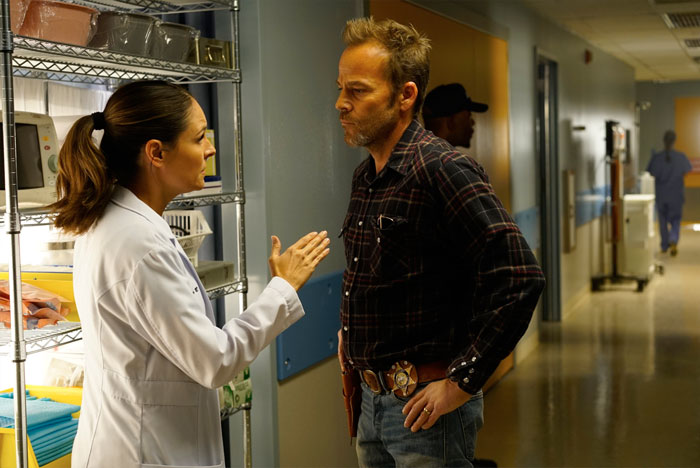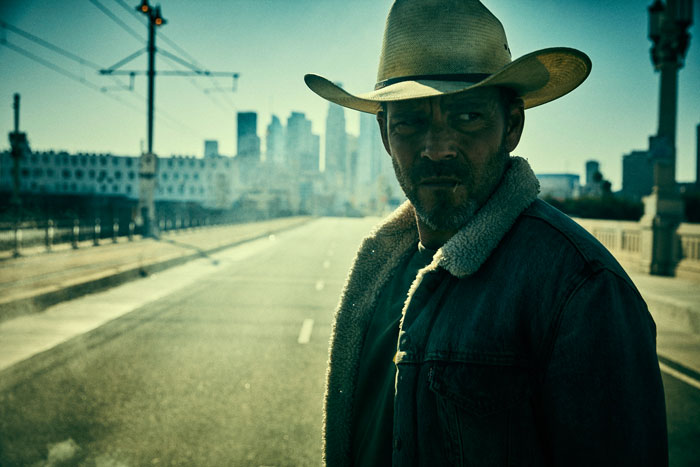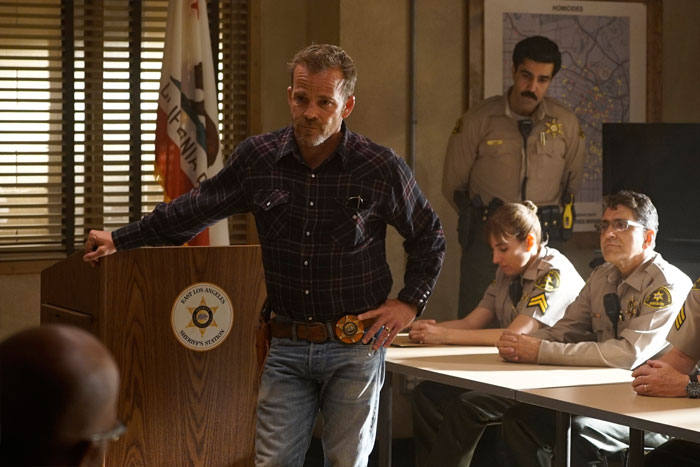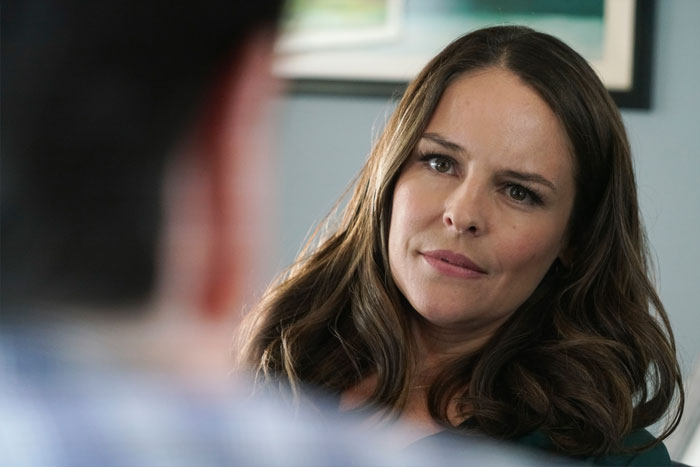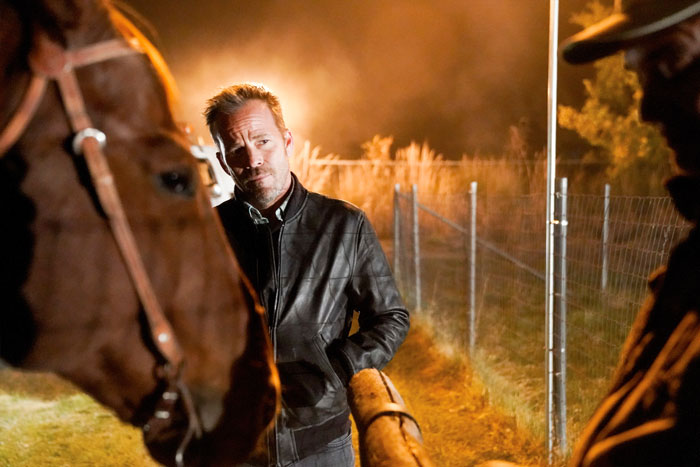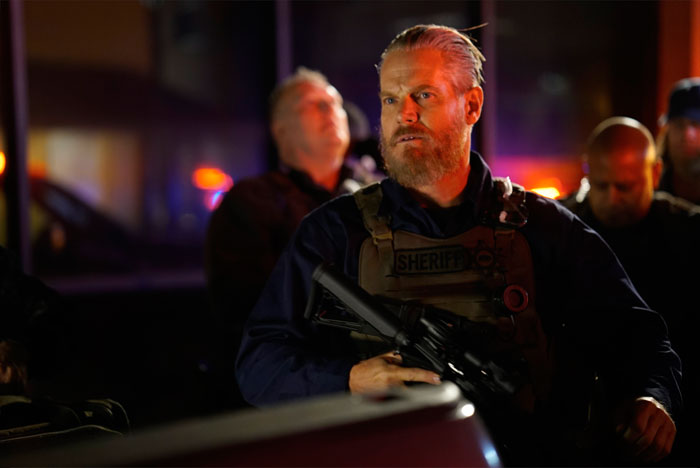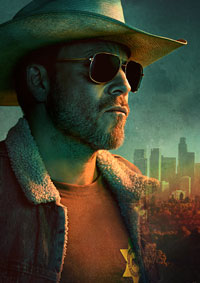TV
Startseite > TV > Serien | 25.03.2020
SERIEN
DEPUTY - Einsatz Los AngelesSeine Stadt, seine Regeln: Stephen Dorff („True Detective“) brilliert in „Deputy – Einsatz Los Angeles“ in der Rolle des raubeinigen Polizisten Bill Hollister, der unerwartet zum Chef des Los Angeles Sheriff‘s Departments wird. Die moderne und actionreiche Polizeiserie, die am 1. April auf 13th Street startet, vereint vielschichtige Charaktere, die sich dem Kampf für Gerechtigkeit verschrieben haben.
von Richard-Heinrich Tarenz
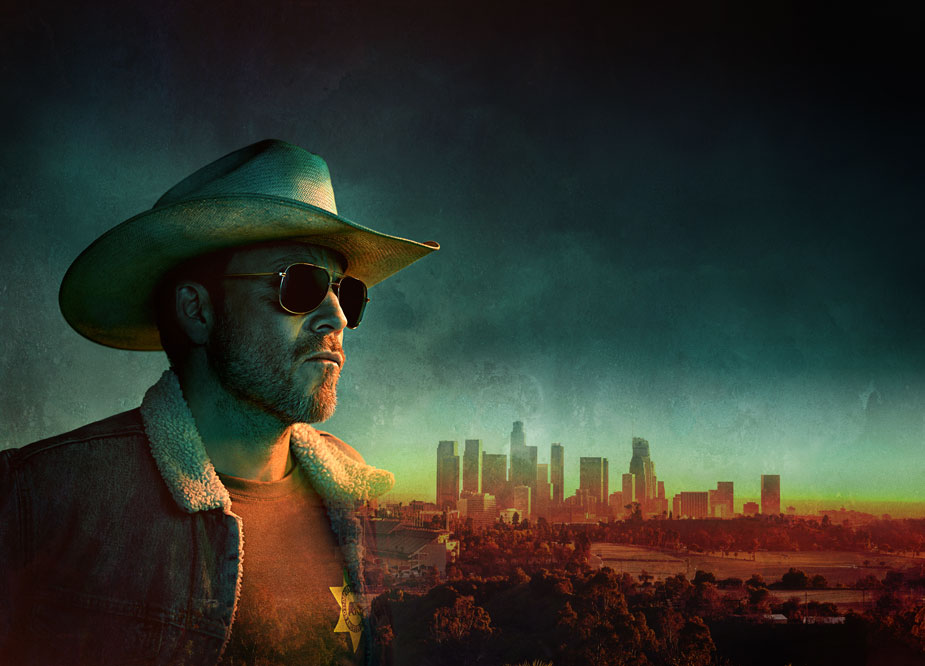
©
13th Street / 2019 Fox Broadcasting Corp.
Das Los Angeles County Sheriff’s Department ist eine der größten Polizeieinheiten der Welt. Als der amtierende Sheriff stirbt, tritt ein ehernes Gesetz in Kraft, das den dienstältesten Polizisten der 10.000 Mann starken Einheit an deren Spitze stellt. Das ist ausgerechnet Bill Hollister (Stephen Dorff), ein Cop in fünfter Generation, der sich im Einsatz für die Unschuldigen durchaus auch gegen den eigenen polizeilichen Verwaltungsapparat stellt. Für Bürokratie und politische Grabenkämpfe hat Hollister nicht viel übrig. Doch die neue Machtposition bietet ihm die Chance, kräftig im Sheriff‘s Department aufzuräumen, was aus seiner Sicht längst überfällig ist. Unter Hollisters Kommando stehen u.a. Deputy Cade Ward (Brian Van Holt), Ex-Marine und einer seiner wenigen Vertrauten, Deputy Brianna Bishop (Bex Taylor-Klaus) als Hollisters brillant-sarkastische Kollegin und Bodyguard sowie Deputy Joseph Harris (Shane Paul McGhie) als Sohn von Hollisters verstorbenem Partner. Hollisters Ehefrau Paula Reyes (Yara Martinez) ist Chef-Chirurgin im L.A. County General Hospital, wo sich ihre Wege oft kreuzen…
© 13th Street / 2019 Fox Broadcasting Corp."Deputy – Einsatz in Los Angeles" ist auf dem Pay-TV-Sender 13th Street zu sehen. Ab Mittwoch, 1. April, wird die erste Staffel wöchentlich, um 21 Uhr, ausgestrahlt. Los geht es mit einer Doppelfolge, ab Mittwoch, 8. April, ist jeweils eine neue Folge zu sehen. Die neue Serie glänzt mit jeder Menge Action, einer intelligenten Handlung und rundweg guten Darstellerinnen und Darstellern. Schon in den ersten beiden Folgen geht es so richtig zur Sache. Langeweile kommt da so schnell nicht auf. Die Serie handelt vom ewig aktuellen Kampf des unkonventionellen idealistischen Einzelgängers gegen Bürokratie und Korruption in den eigenen Reihen und zugleich für seinen kompromisslosen Kampf für Gerechtigkeit.
Dieses Narrativ ist so alt wie Film/Fernsehen und wird in dieser Serie grandios von Hauptdarsteller Stephen Dorff verkörpert. Auf den ersten Blick ist die von ihm gespielte Figur durchaus kontrovers. Sie ist wortkarg und schroff und gelegentlich auch eher unsympathisch. Durch die kluge Erzählweise der Serie entwickelt sich die Figur sehr stark und wird damit für den Zuschauer immer sympathischer. Aber nicht nur die Hauptfigur, auch die anderen Charaktere sind sehr facettenreich gezeichnet. Das macht diese Serie so interessant und sehenswert und hebt sie ab vom üblichen Serien-Einerlei.
© 13th Street / 2019 Fox Broadcasting Corp.Zum Serienstart von "Deputy – Einsatz in Los Angeles" möchten wir Ihnen ein Interview mit Stephen Dorff und Yara Martinez präsentieren, dass interessante und spannende Einblicke in die Entstehung der Serie bietet und sehr unterhaltsam ist. Wie üblich, veröffentlichen wir das Interview im Original, um die Aussagen so wenig wie möglich zu verändern, was bei einer Übersetzung nicht absolut vermeidbar ist. Viel Spaß und Vergnügen!
Did you dress up as a little boy as a cowboy with the sheriff’s star?
STEPHEN DORFF: No, I dressed up more as like Spiderman, and Batman and I was like really into comics when I was a kid. Never as a sheriff. Maybe at a cowboy party or something. I’m sure at some point I had a sheriff’s badge on. But, um no it’s been really cool. I met some really cool people at the LA Sheriff’s department.
YARA MARTINEZ: Hi, how are you guys?
Welcome.
YARA MARTINEZ: Buenos Dias. Good morning. I feel like I should have a PowerPoint presentation…
So, tell me a little bit about the research you did for this role? Did you actually go into, you know, the hospitals to see how it works?
YARA MARTINEZ: No – I wanted to. But, you know its so quick once you get the part until actually shooting. So, David Ayer, the director suggested this documentary called Code Black. Have you seen it? It’s excellent. It’s about ER trauma surgeons. And then we had on set, a trauma nurse that I was able to go to lunch with and have conversations. So, she told me some background stories on some surgeons which apparently, they’re all very cocky. So, that’s something that you know I was able to do. We always have – whenever there’s a hospital scene, there’s always a doctor that I can just reference everything with. So, that was kind of that work. Honestly, for me it was about getting to know Stephen and feeling comfortable with him to be able to have that dynamic. That’s something that David did immediately off the bat. We shot the pilot in Atlanta, some parts here in LA, but mainly in Atlanta. And when Stephen and I were cast – David had us do a Dojo class.
That’s how Stephen and I met. Then David came and met with us. We had this very intense, very open, very vulnerable meeting with him. I have to give it to Stephen because he asked Stephen the first question. Stephen was completely open and willing to going there. And I was like “oh man, that means I have to, to”. And then when it was over, David left and Stephen and I were like “what just happened?” That was the weirdest experience, but it must have worked because we felt so much closer to each other. Then we went to get coffee. But, it just worked in such a better way then just going to dinner with an actor you and like trying to get to know each other over dinner or coffee. You know, like David just cut out the fat and got to the truth which was able to provide us or at least me, with just a more open and relaxed relationship with Stephen and I felt like I could really trust him to like play and stuff.
© 13th Street / 2019 Fox Broadcasting Corp.In your Dojo class, did you guys do martial arts?
YARA MARTINEZ: Yes, and it was of course. I like to box. I like to box for exercise. So the night before, I busted my back. I was like I can’t believe I have to meet David and Stephen with a busted back. And I showed up with a high pony – super cute – ready to do Dojo. And you were like – remember, you were just like…
STEPHEN DORFF: I was like this is the dumbest thing I’d ever seen. I had just finished a movie where I played a UFC fighter and now, I’m in this Dojo with this guy. But anyway, it was interesting.
YARA MARTINEZ: It was funny.
STEPHEN DORFF: I didn’t know Bill was a karate expert. I didn’t get that from the script.
YARA MARTINEZ: It was interesting.
Can you talk about the dynamic of the couple you are portraying on screen?
YARA MARTINEZ: I think Bill and Paula really love each other. They have a really strong foundation. And I think Paula really sees Bill as her hero. Not that she needs one – she’s definitely her own hero, but in that old school way of just being able to be this independent woman and also having a man who’s chivalrous and really loves and admires and listens to her.
STEPHEN DORFF: And I think one of the cool parts about this show is obviously number one it’s a pretty ‘balls to the wall’ action show. You know, its built to entertain. At the same time very intense lead character who’s different. He’s not a politician. He’s in a political job now and his life is completely changing, and I think in order to have the strength to even have been a deputy as long as Bill was and to kind of throw his life on the line for all these people you never know. That’s his job. That’s an admirable thing about law enforcement. You know I don’t throw my life on the line everyday, I’m an artist. But you know, I have an incredible amount of respect for the military, firemen. I have an incredible amount of respect for all walks of law enforcement. I think what makes the show really cool as well is the fact that we don’t just see this tough guy kicking butt all the time, we actually see him vulnerable when he goes home. We see the strength he has on the home-front that gives him the power to be able to have that confidence to mix things up and shake this whole department up.
And that’s ultimately what’s gonna happen when we get to know these characters. But Paula and my daughter – these two Latina beautiful women, is a place where we get to see Bill as Bill. We get to see a boyish quality. We get to see a guy with a daughter who’s getting older and wearing hot pants to school and is going to start dating and it’s like “woah what is going on?” I think that’s scary for any parent. Especially Bill Hollister who is really tripping out that his baby is growing up very fast. And he’s supporting his incredibly tough, smart, educated, incredible surgeon wife that is there for him and is really tough with him and gives him that strength. And I think you know two very powerful people with powerful jobs in their own right, living under the same roof so they somehow must balance each other. And we have a very cool – I love doing those scenes that explore that family life. Because I think without that you don’t get a real well-rounded sense of who that character is. That’s been really fun part of the show for me.
© 13th Street / 2019 Fox Broadcasting Corp.YARA MARTINEZ: It’s also cool because you also see Bill support Paula. You know, it’s interesting because they’re both these really tough people who are basically in the business of saving lives. Just in very different aspects. But there’s definitely scenes when you see Paula having to deal with the politics of the hospital. Bill is there for her. He can be her rock as well. I love exploring both sides of that.
Steve, you just touched on something that I found to be the most surprising aspect of the pilot. When we meet your character, he’s in the mold of this like ancient character type – he’s busting down doors, pulling out guns, putting his life on the line. I’m like alright this is someone who has committed to the idea that he could die at any moment. Then when it is revealed that you have this family, I’m like “oh my god, that’s a strong juxtaposition.” Do you understand the mentality of someone who has a family and people who depend on him, but also could be ready to die at any moment?
STEPHEN DORFF: Yeah, I mean that’s the admirable thing of these families of law enforcement or firemen. You don’t know if you’re going to see your dad again when he leaves the house that morning. If there’s some incredibly large fire. You’re almost that much closer. You don’t take things for granted as a lot of people do. You think in life, “oh I come from a great family” -- Which, I was very lucky to -- “Nothing will ever happen to me.” But, the reality is, it happens to all of us at some point. I lost two members of my family in my later years and its changed my life immensely.
So, I can only imagine if my dad had been in law endorsement, what that would have felt like everyday as a kid. I guess the kids themselves grow up with this sense of “this is what my father/mother does, and this is what makes us different as a family, but we will hope for the best.” I think it can get tricky at times, especially if you’re as wild as Bill. Bill is doing things that most sheriffs aren’t doing. They’re supposed to get lunch at the Beverly Hills hotel with the mayor. They’re supposed to be attending functions and shaking hands and budget meetings and Bill is throwing himself out of a helicopter with an AR-15 taking down a drug dealer. He’s crazy, he’s almost asking for it. I think this is part of the stress, is be smart and –
YARA MARTINEZ: Don’t die!
STEPHEN DORFF: Because I think in the backstory – what me and David Ayer created for Bill – not only did he lose his partner, which that’s why he has his godson in the pilot, that relationship will really prosper and grow between me and Joseph as father & son in a weird way, or as brothers. Somebody I had to make a promise with. When you lose a partner, it’s like losing a relative. That was my responsibility. We will probably delve into that at some point later. To go back to what I was saying, David and I created a backstory for Bill which I asked “why would he be in the mounted unit in the beginning of this pilot? Why am I attacking everything? Why am I in the mounted detail?”
Because that is usually is a place where people go to slow it down to end their stuff, to take an edge off being on the street? They want to be more patrolling parades downtown on horseback – it’s a slower position. He said that Bill probably after his partner died, probably a year after the pilot, probably almost died. Probably got shot and almost died. So that was a deal they made -- Bill and Paula, to slow it down. Even though, when you hear the call on the radio, he’s like a crazy person with the bad guys. He’s obsessed. And always having a best friend, Cade, Brian Van Holt’s character, being the guy who’s always giving him the tips on what’s going on. It’s a real asset for me., but also a dangerous position for me, but I’m going to get yelled at by Paula if I’m hanging out of choppers.
© 13th Street / 2019 Fox Broadcasting Corp.YARA MARTINEZ: And he’d have to deal with me if you died.
STEPHEN DORFF: Ultimately, it’s a cool thing for a one-hour drama on network TV. I think we want the show to feel real and shot more like a film, not this glossy television stuff. I don’t really like network TV frankly because they seem fake and on a sound stage and they all look the same and they’re all usually about the same thing. This is an old school platform of like what the old shows were. It’s not really brain surgery. It’s good versus evil. It’s family. It’s love. It’s heroics. It’s the LA sheriff’s department, but in a much more real, visceral, dirty, realistic way. I think part of what David did visually in creating the look of the show was really effective. There’s not much on TV that looks like that. I was happy about that. I’m happy the audiences were responding.
I was about to say, it’s like a fish out of water, because you character is more of a nature guy, but he’s now working in the city with all the politics of being a sheriff. So, I was wondering are you a nature guy or more of a city boy? Also, another thing that surprised me most to see, it’s not the courage and heroics of the police officer, but the show also gives some critique of what’s wrong in the police department and law enforcement in this day and age. So, was that important to you?
STEPHEN DORFF: Yeah, I mean I think coming off of True Detective which was so character driven and so different from network TV, it was hard to jump into this show. But, I did see an opportunity in Bill Hollister that I didn’t see in a lot of network and cable TV shows. I liked the fact that David Ayer was directing. I was a fan of End of Watch and Fury and some of the smaller intimidate character driven films he’s done. He really brings an authentic look to the streets because he comes to the streets in a lot of ways. The authenticity was really important and I thought “wow I have the right director.” This is the first time he’s stepping into this TV foray, I’m new to this foray. As long as we get good actors around me, my wife, best friend, and the writing is there, then we can really push this and make a typical cop show, but have it elevated to a much more modern place that we’re all in today. And as far as me personally, I’m really split between city and nature. I like the beach and being in the middle of no where, but I’m from the city. I’m from LA. My parents are from NY.
So, I grew up kind of in both. There are really no cities like LA and NY and they really couldn’t be more different. I’m kind of city boy I think at heart you know – Stephen. I never was a big horseback rider, but I’m getting better at it. The western thing has kind of followed me around from True Detective, into the film I did that’s coming this summer where I play a street fighter who from Alabama to Bill Hollister, even though Bill is from California, he’s a California rancher. They live out in Santa Clarita and he would much rather be on a horse then in a board room with a bunch of suits. That’s just who he is. So, its kind of interesting when I pick where I’m gonna wear the uniform and where I don’t because Bill is the kind of guy that doesn’t really want to wear the uniform and doesn’t feel like he needs to for a bunch of suits who are doing the wrong things for the department, you know he’s going to shake it up. Up until election time, and I think then he’ll have to put on the uniform and play the game, daddy.
YARA MARTINEZ: I mean that’s like going back to the first question. That’s one of those things that Paula has to deal with. She thinks finally he’s going to behind a desk and going to parties. I can relax, I don’t have to worry.
STEPHEN DORFF: Meanwhile, he’s going crazy.
YARA MARTINEZ: I mean, that's like. Going back to the first question, like that's one of those things that Paula has to deal with because she thinks like he got this position, so finally he's going to be in the office behind a desk. We'll be going to parties, you know, like -- I can relax. I don't have to worry.
STEPHEN DORFF: If anything, Bill's is going crazy. It's given him a hall pass to do more stuff. That he wouldn't have done in the beginning.
© 13th Street / 2019 Fox Broadcasting Corp.YARA MARTINEZ: Which gives me more of a headache. But part of the research that I did, was I ended up speaking to an officer that's in the pilot, Jamie. He's actually the sheriff of Breckenridge and he was an undercover cop and I ended up speaking to his wife for like three hours and just listening to her talk. And she's like the nicest. She's like, this is the sweetest voice. And then the second she started speaking about, like, whenever anybody talks bad about the sheriff department or anything, like her voice completely changed. She became like -- you just felt like the roots of like the earth, coming up through her with the strength. And then also when she started talking about what it feels like every day when he walks out the door. And you can just hear her heart in her throat, you know, and it's like living with that. It's always like right here like "is my husband can come back home?"
STEPHEN DORFF: It's a choice. Like you were saying. I mean, it's hard.
YARA MARTINEZ: You have to believe in the greatness that your job can do.
STEPHEN DORFF: My first time I felt that was like -- I have my assistant, Lori has been with me forever, who's married to a sergeant in the LAPD. You know, I was around law enforcement a lot. If there were Malibu fires near where I lived, he could always go and cut the line and get in there, see if my house was OK. You know, if I was out of town shooting or something. You know, I've had some law enforcement around me and I've met a lot of law enforcement over the years. But then I played Scott Strauss, who was an ESU worker in World Trade Center in Oliver Stone's movie. That was a great experience. I got to know Scott, meet his family. When you're playing a real-life person. Somebody like Bill Hollister. I wanted to just be around deputies and the sheriff department. You know, Mark Schlegel -- I'd go out with one of our main techs and he's involved in a lot of these stories that were breaking in the writers room at some degree. And I want more of that, because having the real guys is always way more effective than just having a bunch of writers in the room.
You know, you need to know what are the crimes? You know, my good friend just got robbed in Hidden Hills yesterday. Hidden Hills is this gated community where Kanye West and all these people live. And there's a huge -- they didn't go subtle either. They broke down the glass in the bedroom. And like you just see this hole. She sent me pictures. I was like, “this happened in Hidden Hills?” That's a more simple crime. That's something that like home invasions -- we deal with them in an episode. We deal with the homelessness epidemic, which is a huge thing that's happening in this town and all over the country. We're dealing with current things. I mean, the ICE thing, I think caused a bit of a red flag for some people, which I think caused an argument. It's cool that Fox would allow you know, Fox is a very--
Then you say they're all immigrants.
STEPHEN DORFF: Yeah. I mean, the truth is, we all come from where we come from. Our families all come. You know, and so you know what, Bill is not against necessarily an ice raid. He’s against doing it if we're not prepared and we're going to only get one bad fish and then disrupt thousands of people's lives and children and separate families. That's not what he's about. He's about -- let's root out the problem and let's do our research. But let's not just do this so we can get a budget influx for the California, you know, whatever. You know, he's not interested in budgets and he's not interested in doing those things and I'm sure will bite him in the ass. Coming up in the future, if this show is a success, which it's kind of started really well out of the gate. You know, we'll take them in all those directions, but there will be a constant. So I just felt like this character had a place to go, whereas most TV shows in success are limited. What is the second season going to be? What's the, you know, they don't even think that far ahead. Whereas this show’s like old- school TV? You know, if this character works, you can run this guy until he dies. You know you can.
You ready to?
STEPHEN DORFF: I don't know. I don't know. I don't know if I am. But I you know, I think as long as the writing is great. And it's a show that the audience responds to that, then, you know, I've been having fun playing a character that lasts longer than two hours. You know, in a movie, you're very limited. You know, you can lay it down.
You still want to do movies, right?
STEPHEN DORFF: I mean, yeah, like I'll make a movie, too, you know, hopefully every hiatus if I'm not too tired.
YARA MARTINEZ: 13 episodes. You know this is time.
STEPHEN DORFF: But the truth is. But, you know, in the future, it will be more than that.
YARA MARTINEZ: It will? Are we still going to be shooting in Albuquerque?
STEPHEN DORFF: The thing is, FOX, I think they do shorter orders because they have 10 o'clock news. I think the most they do is like 18 or 19. Or maybe 20. I don't know. But it's still a lot.
YARA MARTINEZ: When are you going to do a movie?
STEPHEN DORFF: It took seven months to shoot eight episodes of True Detective, you know. So that was like a long, long movie. And that's kind of. This will be.
© 13th Street / 2019 Fox Broadcasting Corp.You learn something.
STEPHEN DORFF: Six, seven months in or by the end of a long season. I'm off basically from February, end of February, March, April, May, June, probably until I have to come back. So there's time to do a movie, probably. But I usually don't get tired. I do it as I work. I went straight from True Detective into a pretty physical movie. And then I kind of went right into the pilot. A month off, and I went right into the pilot. Then we had a little break and then I've been going non-stop on Deputy. So, you know, it definitely takes you out of certain movies if they're going at this time. I've missed some things, but I like the idea of playing a character for a long time. If the character continues to be interesting, I think that can be fun. Because I know the movies, it's just a little bit. There's only so much you can do. There's only so much you can fit in.
You have the one big scene in the opening. You have usually the big third act scene after a hit and you have some stuff in the middle. But I enjoy True Detective because I had like 50 of those scenes as opposed to three. You know, every great film, you'll have three of those scenes, maybe -- maybe two. And those are the scenes that either win you the award or don't or make the movie work or don't. You know, in TV you get the opportunity to have many of those if you can, you know, create a great, great thing. So it's a new world. Yara has way more experience in the network TV game and then TV in general than I do. But it's been fun. And we have a great cast and a really great crew. I'm looking forward to come to L.A. and shooting more and shooting some of these last episodes in L.A. because it's a little tricky being in a different place when the show takes place in L.A. We should be here shooting, you know. And so it's kind of like, you know, you cheat here and there. But it's been -- I've been having a good time.
Because you said initially that you have been hanging out with real deputies, that I was just wondering, how true to life is his role? Because I'm guessing your character sees a lot more action than a regular sheriff.
STEPHEN DORFF: Like Mark sees a lot of action. I mean, they have team you know, Mark's kind of a sergeant of major crimes, which is more Brian's character. You know, Brian Van Holt and Kate's character in the show. And, you know, I sat on a couple ride alongs where we tracked a guy from Burbank all the way to Long Beach. We followed them with second cars on the freeway. He had no idea. We're all unmarked cars. They're all in plain clothes. I mean, it was pretty exciting. And it could have gotten hairy. You know, he could have gotten out of the car with a gun and then they would have been in a shootout. You know, I mean, obviously, Mark was trying to protect me that day. And I was in the head honcho's car, a little bit behind. But we were in it, you know, we were on that mission.
I did a couple other missions with him. I mean, these guys, if they have to, they're going to pull their weapon on them. They're going to go, you know, I mean, there's no free time, really. You know, they're home with their families, but they're always kind of on a case. They're always on. I mean, it's really interesting. It was a funny story is that when my first day to meet Mark Schlagle was like I had to be from Malibu in Burbank at 8 a.m. to meet them at this Starbucks, where I guess the team meets where we would lay out the plan where we were going to meet the suspect and wait for him at the courthouse and then follow him and do this whole thing. Put a tracker on his car. All this stuff. So I get there at 8 a.m. I parked my car. I'm like, is this cool to park here? It's like, yeah, I figure, well, I'm with the sheriffs. And I got back at five pm and my car had been towed. Mark Schlagle, the sheriff from the sheriff's department, had to drive me to like Sunland in the valley to get my car. It was pretty funny. So I said, I'll talk about that in interviews.
Do you feel sexy in the uniform of the sheriff? Maybe it's the half thing or something. They say, you know, people in uniform.
STEPHEN DORFF: I mean, I don't mind wearing it. You know, it's again, tricky where I pick to wear it because I like him in his normal look, too. I like the cowboy look for Bill. And I think when he's in action mode, he's more tactical that way. He couldn't be running around chasing gangsters in a full-time uniform. And it's a pretty intense uniform and has a lot of weight. So, we kind of balance it out. If it's a big meeting with the mayor or something, I'll put the uniform on. If he's going to kick some butt. He'll probably be in his jeans and his boots.
Thank you.
Von: Will Beall | D: Stephen Dorff, Brian Van Holt, Bex Taylor-Klaus, Shane Paul McGhie, Yara Martinez

